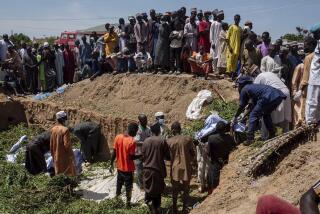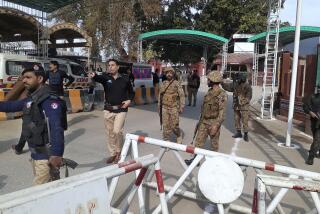Suicide Bomber Kills 60 in Iraq
- Share via
BAGHDAD — A man with a bomb strapped to his waist walked up to a fuel tanker and blew himself up Saturday, setting off a roaring inferno in the crowded and cramped streets of an impoverished town south of Baghdad that killed at least 60 people.
The explosion ripped through the marketplace in the heart of the predominantly Shiite town of Musayyib when it was packed with families buying ice cream and shoppers who had come out as the worst of the day’s heat ebbed. Many had also gathered at the nearby Shiite mosque around the time of the evening prayer, police sources in Musayyib and Baghdad said.
The warren of streets was so congested that it was difficult for people to escape as fire raced through the surrounding buildings.
Local police told Baghdad officials of a hellish scene in which the flimsy houses behind the mosque almost immediately went up in flames and charred body parts lay scattered around the market and in surrounding streets.
“There was no electricity in the town, so people were coming out to get some air, eating ice cream to cool off,” said a police source in Baghdad who asked not to be named because he wasn’t authorized to speak to the media.
Fuel tankers either outfitted with bombs or blown up by suicide bombers are among the most devastating of weapons used by insurgents because in addition to the power with which they fling shrapnel, they cause raging conflagrations.
The number of dead was expected to climb today because some of the 85 people injured in the blast had burns over much of their bodies. The area is rural and there are few hospitals, let alone burn treatment facilities.
The bombing capped a violent week in Iraq in which 100 people died in insurgent attacks, mostly suicide bombings.
Saturday’s fiery bombing occurred in Babil province, one of the 14 Iraqi provinces that U.S. officials count as “stable.” But Babil has now suffered two of the worst bombings in Iraq in recent months. In March, a suicide bomber at a job center in Hillah killed at least 110 people and injured scores more.
Musayyib, 40 miles south of Baghdad on the Euphrates River, is majority Shiite but near the southern tip of the so-called Sunni Triangle, and assassins have targeted the police force, including a police chief. Residents believe Sunni insurgents from the nearby towns of Latifiya and Mahmoudiya bear responsibility for a number of the attacks.
Over the last year, police in Musayyib have searched almost every car that goes through the town, sharply reducing the incidence of attempted suicide car bombings. But they cannot search every pedestrian.
Meanwhile, in southern Iraq on Saturday, three British soldiers died and two were injured when a roadside bomb exploded near their vehicle. The incident occurred in Amarah, the largest city in Maysan province, an area that has repeatedly proved dangerous for troops from Britain.
“The bravery of our armed forces was yet again underlined as they help Iraq and its people towards the democracy they so desperately want,” British Prime Minister Tony Blair said in a tribute to the men.
Britain’s Defense Ministry said the deaths brought to 92 the number of British troops who have died in Iraq, including 53 killed in action. As of Friday, the official U.S. death toll stood at 1,761, with 1,357 killed in action.
Maysan province has seen several of the most brutal attacks targeting British forces. It was the location of a gruesome execution in 2003 when six British military police were cornered in the police station of a village. The room was peppered with bullets, killing all the men.
In May, two British soldiers were killed in separate attacks near Amarah.
The British have about 8,500 troops in Iraq with responsibility for security in the southernmost provinces of the country.
The Musayyib bombing and the attack on British troops were just two of the deadly incidents Saturday, which also included two assaults in the troubled northern city of Mosul: a suicide bombing that killed four police officers and the assassination of a community leader.
The Mosul neighborhood where the bombing occurred “is the center of terrorists and terrorism, and it is the source of most of the operations in Mosul,” said police Lt. Hassan Daiykh Mohammed, who was injured in the blast. “But despite all difficulties and casualties we have sustained among our men, we will never surrender or submit to those who want to sabotage our country,” he said.
As in the Musayyib bombing, the attacker wore a bomb belt.
In another Mosul neighborhood, insurgents assassinated the community leader, known as the mukhtar, as he sat in his office. A barbershop assistant, Akil Ismael, 26, who was watching the street outside the community leader’s office at the time of the execution, described a chilling scene.
At lunchtime, two cars parked on either side of the road, he said. “There were two men in each car, and then a heavy-built man, his face covered with a scarf and holding a machine gun, entered the mukhtar’s office normally and then sprayed him with bullets. The gunman left rapidly -- I couldn’t do anything,” he said. “We went to the office and we found the mukhtar covered with blood. I am really sorry for him -- he was really a good man.”
In Fallouja, west of the capital, four policemen were killed in an unspecified attack, said Dr. Mohammad Dulaimi of the Fallouja hospital. “Four dead bodies were brought to the hospital, and all were wearing uniform,” he said.
*
A special correspondent in Mosul contributed to this report.
More to Read
Sign up for Essential California
The most important California stories and recommendations in your inbox every morning.
You may occasionally receive promotional content from the Los Angeles Times.












